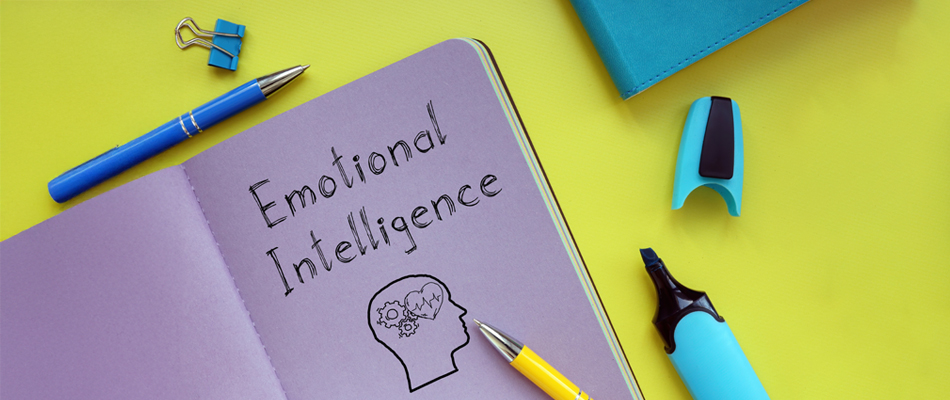Being emotionally intelligent teachers is increasingly important in South African classrooms where diverse learner needs, trauma exposure, and socio-economic stressors are common. The Regenesys Bachelor of Education in Senior Phase and Further Education and Training Teaching equips future teachers with emotional and spiritual intelligence through targeted EQ training, reflective practice, and leadership development, making graduates better prepared to build safe, empathetic, and effective learning spaces.
In this article, we will cover how emotional intelligence is developed in the Regenesys BEd qualification and why it is essential for teaching success.
Table of Contents

Role of EQ in Education
The role of emotional intelligence for teachers is foundational to modern education. Therefore, teachers must do more than deliver academic content. They must also connect with learners on an emotional level, manage complex interpersonal dynamics, and create safe, inclusive spaces for growth.
Emotional intelligence shapes how teachers think, act, and interact in the classroom. Its role can be observed in several core areas:
1. Classroom management
Emotionally intelligent teachers are more empathetic and fair in setting boundaries and handling behaviour, which leads to calmer, more consistent classrooms.
2. Conflict resolution
Teachers with high EQ remain composed in tense situations, guiding learners toward peaceful and respectful solutions.
3. Learner engagement
EQ helps teachers build emotional connections with learners, increasing motivation, participation, and trust.
4. Teacher-student relationships
Understanding learners’ emotions fosters deeper rapport and makes learners feel seen and supported.
5. Peer collaboration
Teachers with strong emotional awareness communicate more effectively with colleagues and contribute to a positive school culture.
6. Teacher wellbeing
Managing personal emotions reduces stress and burnout, making teaching more sustainable over time.
Read more on What is a Bachelor of Education (BEd)? Scope, Eligibility, Duration & Career Opportunities here
Self-Awareness and Reflection
Self-awareness lies at the heart of emotional intelligence for teachers. It allows teachers to recognise their emotional responses, understand their own behavioural patterns, and manage reactions under pressure. When teachers are self-aware, they are more likely to make thoughtful, emotionally balanced decisions in the classroom.
During the Regenesys Bachelor of Education in Senior Phase and Further Education and Training Teaching, self-awareness is cultivated through structured reflection practices integrated into academic modules. These activities support the development of emotionally intelligent teachers who can navigate diverse teaching environments with confidence and clarity.
The benefits of regular reflection include:
- Personal growth and emotional maturity, which are critical for professional development
- Alignment between personal values and teaching practice, helping teachers act with consistency and integrity
- Mindful responses to classroom challenges, rather than reactive or emotionally charged behaviour

Managing Classroom Stress
Managing stress is a daily reality for teachers. From lesson planning and marking to behaviour management and learner support, the pressures of the profession can quickly lead to emotional exhaustion. For South African teachers working in resource-constrained or emotionally demanding environments, this stress is often intensified.
This is where emotional intelligence for teachers becomes vital. Through EQ training in the Regenesys BEd qualification, future teachers learn to recognise early signs of stress and apply practical techniques to manage it before it escalates.
Regenesys equips teachers with soft skills that support resilience and emotional regulation, such as:
- Time management and prioritisation skills, helping teachers handle workloads efficiently
- Breathing and mindfulness techniques, promoting calmness and mental clarity in the classroom
- Cognitive reframing, which enables teachers to shift negative thinking into constructive action
By incorporating these coping strategies, teaching becomes a more sustainable and balanced profession where professionals can thrive.
Teacher-Student Emotional Connection
Effective teaching depends not only on subject knowledge but also on the quality of relationships built in the classroom. A teacher’s ability to establish trust, mutual respect, and clear communication with learners directly influences learner engagement and academic performance.
Emotional intelligence for teachers plays a critical role in this process. It enables teachers to recognise emotional cues, manage their own reactions, and respond to learners in ways that are both supportive and appropriate.
During the BEd qualification, aspiring teachers are trained to:
- Identify shifts in learner behaviour that may indicate emotional or academic concerns
- Respond with professional empathy, balancing care with classroom expectations
- Maintain a consistent, safe environment that supports positive learner interaction
These skills contribute to improved classroom dynamics and support the development of productive teacher-learner relationships.
Dealing with Trauma in Learners
Some learners in South African schools may face personal or community challenges that affect their emotional well-being and classroom engagement. A high emotional intelligence in teachers plays an important role in identifying and supporting learners who show signs of emotional strain.
Through EQ training, teachers are prepared to:
- Recognise behavioural patterns that may reflect emotional stress
- Respond with composure and sensitivity in emotionally complex situations
- Create a stable environment that supports learners’ sense of safety
- Connect learners with appropriate school-based or external support services
Creating Safe Classroom Spaces
A safe classroom environment is one where learners feel respected, supported, and free to express themselves without fear of ridicule or exclusion. Emotional safety is particularly important in diverse South African classrooms, where learners come from a variety of backgrounds and experiences.
Teachers are responsible for setting the tone, and the BEd qualification ensures they are well-prepared. Through its focus on emotional intelligence for teachers, the qualification equips future teachers with the tools to establish and maintain emotionally secure learning spaces.
When teachers create safe classroom spaces, it leads to several long-term benefits, such as:
- Increased learner confidence and willingness to engage
- Fewer behavioural disruptions and improved classroom management
- Higher academic achievement and reduced dropout rates
Read more on Why a Bachelor of Education (BEd) is the Best Career Choice in South Africa? here
Conflict Management
Conflict is a natural part of the school environment. Whether it arises between learners, among staff, or in teacher-learner interactions, the ability to manage it effectively is essential for maintaining a stable and respectful classroom.
Emotional intelligence for teachers supports the development of proper conflict management techniques. The BEd qualification helps future teachers understand how to approach conflict in a structured and emotionally aware manner.
Understanding conflict management is important because it allows teachers to:
- Maintain a calm and controlled classroom environment during tense situations
- Prevent minor disagreements from escalating into major disruptions
- Model respectful communication and problem-solving for learners
- Strengthen professional relationships through constructive dialogue
- Reinforce a classroom culture based on fairness, accountability, and mutual respect
Mindfulness in Education
Mindfulness has become an important component of teacher preparation, particularly in the context of emotional regulation and classroom presence. It supports teachers in staying focused, managing stress, and responding thoughtfully rather than reacting impulsively. In South African classrooms, where teachers face varying emotional and behavioural demands, mindfulness contributes to a more stable and supportive teaching environment.
The BEd qualification integrates mindfulness as part of its broader focus on emotional intelligence for teachers, encouraging reflective, composed, and attentive teaching practices.
Listed below are some benefits of mindfulness in education:
- Improved emotional regulation, helping teachers stay calm during challenging moments
- Greater patience and tolerance, particularly in high-pressure situations
- Enhanced focus and attention, leading to more effective lesson delivery
- Better classroom awareness and responsiveness to learner needs
- Reduced stress and improved overall well-being for sustained teaching performance
EQ as a Leadership Tool
Emotional intelligence is a core competency for teachers in leadership roles. Beyond managing classrooms, teachers are often required to guide colleagues, support learners, and contribute to the school’s overall ethos. A teacher with strong emotional intelligence can lead calmly, project empathy, and display sound judgment.
The Regenesys BEd includes practical soft skills teaching and emotional intelligence to support the development of well-rounded educational leaders.
Listed below are some ways in which emotional intelligence in teachers can act as a leadership tool:
- Building respectful, collaborative relationships within school teams
- Encouraging a positive, inclusive school culture
- Leading with fairness, empathy, and ethical clarity
- Navigating change and conflict constructively
- Inspiring trust and setting a profe
Read more on How to Become a Teacher in South Africa: Step-by-Step Guide here

Conclusion
Teaching in South Africa demands emotional resilience, relational awareness, and the ability to connect meaningfully with diverse learners. Teachers must manage their own emotional responses while navigating the unique challenges that come with shaping young minds in often complex and under-resourced environments.
The Bachelor of Education in Senior Phase and Further Education and Training Teaching at Regenesys is specifically designed to nurture these vital attributes. Through a curriculum that integrates academic rigour with practical modules, reflective activities, and soft skills training, students are equipped to handle the interpersonal dynamics of teaching with confidence and empathy. This holistic development ensures that graduates are not only proficient in curriculum delivery but are also emotionally grounded and professionally resilient.
Start your teaching journey with Regenesys today. Visit our website to learn more about our Bachelor of Education qualification.
Emotional Intelligence in Teaching – FAQs
Why is emotional intelligence for teachers so important in South Africa?
Teachers with emotional intelligence are better prepared to offer stability, support, and understanding, which improves classroom outcomes and learner engagement.
How does BEd equip teachers with emotional and spiritual intelligence?
The qualification helps to build soft skills through theory and reflective practices, to ensure graduates are emotionally self-aware, resilient, and skilled in managing relationships in the classroom and school community.
How does EQ affect classroom management?
Teachers with emotional intelligence can maintain a calm, fair, and structured classroom environment. This helps prevent behavioural issues and promotes consistency and trust.
Can emotional intelligence for teachers improve learner performance?
Yes. Learners are more likely to succeed academically when they feel emotionally safe, respected, and supported. EQ helps teachers create these conditions.
What is the connection between mindfulness and EQ in teaching?
Mindfulness supports emotional regulation, patience, and classroom focus. These are essential components of emotional intelligence and are included in the Regenesys programme.
Why should I choose Regenesys for my teaching qualification?
Regenesys offers a comprehensive Bachelor of Education that prepares teachers academically and emotionally. The focus on emotional and spiritual intelligence makes it uniquely suited to meet the real-world demands of South African schools.






